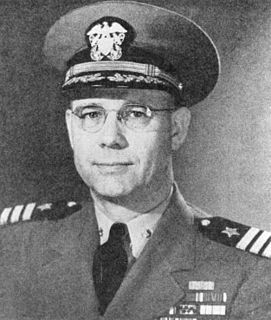Jacob Lienhard was an officer in the United States Marine Corps during World War I. He would be awarded the Navy Cross and the Distinguished Service Cross.

The United States Marine Corps (USMC), also referred to as the United States Marines or U.S. Marines, is a branch of the United States Armed Forces responsible for conducting expeditionary and amphibious operations with the United States Navy as well as the Army and Air Force. The U.S. Marine Corps is one of the four armed service branches in the U.S. Department of Defense (DoD) and one of the seven uniformed services of the United States.

World War I, also known as the First World War or the Great War, was a global war originating in Europe that lasted from 28 July 1914 to 11 November 1918. Contemporaneously described as "the war to end all wars", it led to the mobilisation of more than 70 million military personnel, including 60 million Europeans, making it one of the largest wars in history. It is also one of the deadliest conflicts in history, with an estimated nine million combatants and seven million civilian deaths as a direct result of the war, while resulting genocides and the 1918 influenza pandemic caused another 50 to 100 million deaths worldwide.

The Distinguished Service Cross is the second highest military award that can be given to a member of the United States Army, for extreme gallantry and risk of life in actual combat with an armed enemy force. Actions that merit the Distinguished Service Cross must be of such a high degree that they are above those required for all other U.S. combat decorations but do not meet the criteria for the Medal of Honor. The Distinguished Service Cross is equivalent to the Navy Cross, the Air Force Cross, and the Coast Guard Cross.
His Navy Cross citation reads:
The President of the United States of America takes pleasure in presenting the Navy Cross to Second Lieutenant Jacob Lienhard (MCSN: 0-557), United States Marine Corps, for extraordinary heroism while serving with the 17th Company, 5th Regiment (Marines), 2d Division, A.E.F. in action near St. Etienne, France, 4 October 1918. Second Lieutenant Lienhard led his men in an attack on a strongly held enemy position through heavy machine-gun and shell fire, and although severely wounded continued to lead and encourage his men.
His Distinguished Service Cross citation reads:
The President of the United States of America, authorized by Act of Congress, July 9, 1918, takes pleasure in presenting the Distinguished Service Cross to Second Lieutenant Jacob Lienhard (MCSN: 0-557), United States Marine Corps, for extraordinary heroism while serving with the Seventeenth Company, Fifth Regiment (Marines), 2d Division, A.E.F., in action near St. Etienne, France, 4 October 1918. Second Lieutenant Lienhard led his men in an attack on a strongly held enemy position through heavy machine-gun and shell fire, and although severely wounded continued to lead and encourage his men.
Lienhard was born in Plymouth, Wisconsin. [1]








